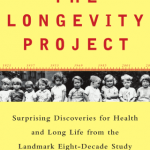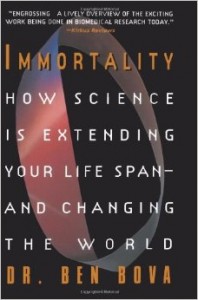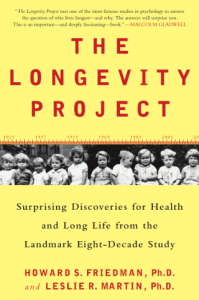 Here’s my latest MoneySense blog, which they’ve titled Working to Live Better, Longer. Since it’s based on a reading of books about Longevity and even Immortality, we’re housing it here at the Hub in the Reviews, Encore Acts and Longevity & Aging blog categories.
Here’s my latest MoneySense blog, which they’ve titled Working to Live Better, Longer. Since it’s based on a reading of books about Longevity and even Immortality, we’re housing it here at the Hub in the Reviews, Encore Acts and Longevity & Aging blog categories.
Click on the red link above to reach the MoneySense version or if you want to see images of the book covers discussed, they are in the version posted below. (The two sites tend to use different images to illustrate):
By Jonathan Chevreau
Whenever I suggest in a blog that investors might want to rethink Early Retirement, I usually hear from a few readers who insist that after 30 or 40 or more years in the workforce, they have a “right” to spend their last decade or so in the pursuit of leisure.
Readers are of course perfectly free to reject exhortations to “just keep working” but if I end up in email correspondence with them, I may reply that my stance is not predicated on the desire to give the financial industry still more assets to place under management.
 Rather, it’s based on my growing perception that life expectancies are on the rise and the pace of medical breakthroughs in biotech and gene therapy does not appear to be slowing.
Rather, it’s based on my growing perception that life expectancies are on the rise and the pace of medical breakthroughs in biotech and gene therapy does not appear to be slowing.
As long ago as 1998, Dr. Ben Bova wrote a book that takes Longevity to its Reductio ad absurdum: Immortality. His book Immortality bears the subtitle How Science is Extending Your Life Span – and Changing the World.
True, Bova is also a prolific science fiction writer but it’s worth reading his take on the future of molecular engineering, regeneration, telomere research, reverse aging, gene therapy and the rest of it just to open one’s mind to the possibility our biblically allotted three-score-and-ten or three-score-and-twenty (70 and 80 respectively) may be underestimating 21st century science.
Who wants to live forever?
Perhaps such breakthroughs won’t occur soon enough to extend the lives of most of today’s baby boomers, but the generations behind them (Generation X and Millennials) should certainly take the very long view of their probable extended longevity. The late Queen lead singer Fred Mercury famously sang “Who wants to live forever?” but departed this earth way too early. If you can live 10 or 20 years longer AND spend that extra time in robust health, I can’t imagine anyone turning down the chance to do so.
Stress doesn’t seem to hurt longevity
 More down to earth is another book, entitled The Longevity Project, published in 2011 by two health science Ph.Ds, Howard Friedman and Leslie Martin. It’s a fascinating examination of an eight-decade long research project conducted by Lewis Terman, who tracked the lives and lifestyles (and deaths) of 1,500 Californians through most of the 20th century.
More down to earth is another book, entitled The Longevity Project, published in 2011 by two health science Ph.Ds, Howard Friedman and Leslie Martin. It’s a fascinating examination of an eight-decade long research project conducted by Lewis Terman, who tracked the lives and lifestyles (and deaths) of 1,500 Californians through most of the 20th century.
I don’t intend to review the book here but wanted to focus on the tenth chapter, on Careers, Success and Satisfaction because it goes to the heart of how I began this blog in referencing Early Retirement. The authors find common exhortations for staying healthy – such as “Relax,” “Avoid Stress” or “Don’t work too hard” turn out to be poor advice. They pose an interesting rhetorical question:
“Could it be that if you give up an interesting, demanding job to retire and move away from your friends to live in a warm-weather gold community you may be increasing the risk to your health?”
The Terman results were clear on this: those with the greatest degree of career success were least likely to die young. On average, the most successful outlived the least successful by five years. A stable successful career is “often part and parcel of a successful pathway to long life.” Increasing workplace responsibility may mean a heavier workload but “paradoxically this is helpful to long-term health.”
Even more telling was an analysis the Longevity Project conducted on 720 Terman participants who were still alive in the 1980s, when both the men and women were past the age of 70. Over the next two decades, the dramatic findings were that “the continually productive men and women lived much longer than their more laid-back comrades … It was not the happiest or the most relaxed older participants who lived the longest. It was those who were most engaged in pursuing their goals.”
My 4 conclusions:
So, putting it altogether, here are four of my own conclusions:
- Life is expensive enough but even the prospect of living longer than you once thought should give you pause about retiring at the peak of your powers.
- If you’re happy and productive in your work, count your blessings and don’t be in such a hurry to end that phase of your life.
- If you value a long life, a happy productive career is likely to aid your longevity. And if you’re working longer, that solves the problem of running out of money before you run out of life.
- If you’re NOT happy in your career, perhaps you should consider changing it, whether by retraining or going back to school, with the plan of pursuing an “Encore Career” at the end of it.
Editor-at-Large Jonathan Chevreau runs the Financial Independence Hub and can be reached at jonathan@findependencehub.com


This is a situation where ‘one size doesn’t fit all”. Assuming a person has achieved financial independence the anxiety attached to worrying about whether they will outlive their money is reduced/eliminated. Instead of seeking work that pays they could remain engaged by working for example for a non profit and still derive the same health benefits. The key is to remain engaged and pursue meaningful/challenging activities as long as possible.
For the person that needs to continue working, the key is to find a job that they love and find satisfying for as long as they can.In all probability they will make less but what they gain on the health side more than makes up for it in the long run. This past Monday the Star had an article about who celebrated her 100th birthday by going skydiving. She next plan is to do a shark cage dive. All I can say is wow!